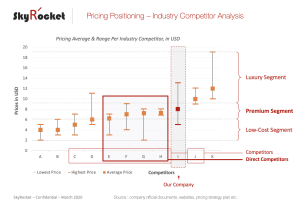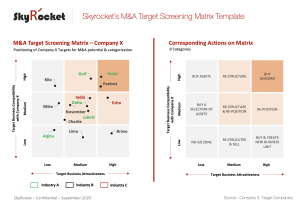
Due Diligence Templates Start the discussion!

Due Diligence (in Business terms)
Due Diligence is the term used when an investigation is being carried out into a company’s information. It refers to the caution one should take before agreeing to a financial transaction or entering into an agreement with another party. E.g. an investor pre-investing or a company pre-acquisition.
Due Diligence can also be carried out by the seller. The selling party may carry out an investigation of its buyer to ensure that the buying party has sufficient resources to complete the purchase.
It is not however, a general investigation. It contains specific aspects that can vary based on the situation. Due Diligence is carried out with the aim of protecting both parties involved, but mainly the buyer, in searching out potential financial issues or liabilities to ensure that nothing will come as a surprise post-purchase.
What does the Due Diligence Process involve?
It is not only the buyer and the seller that are involved in this process. Due to the nature and complexity of the task, usually an attorney and an accountant also take part. If the due diligence is being performed in the case of a business purchase, usually it will be carried out after ‘intent to purchase’ documents have been signed, but before the ‘formal purchase agreement’ is signed.
During a Due Diligence Process, as a Potential Acquirer, you should:
• Go through all documents and records.
• Spend some time at the location of the business in question. (Here you should talk to the staff and management.)
• Compare sales to customer lists to make sure that the business actually has all of the customers it says it does.
• Check over the business’ plans for expansion and property to make sure that everything has been reported accurately.
• Check over the documents that might potentially incur liability for the business, e..g. sales and purchase agreements.
• With the help of an attorney, examine documents referring to any current or past lawsuits.
• Most importantly, record any discrepancies you find between what has been reported and what actually seems to be going on.
• Ask lots of questions. Ensure you have a clear picture.
Common Mistakes made when Performing Due Diligence
Although Due Diligence is quite generic in its nature, no two purchases are the same, so it’s important to keep this in mind. Here are some common mistakes to watch out for:
-Not treating the Due Diligence process as importantly or as thoroughly as it should be treated.
-Leaving out information flow expectations in the sale & purchase agreement terms.
-Carrying it out independently without seeking advice from experts.
-Relying on financial accounts or management information that has not been officially examined.
-Skipping assessment of short-term forecasts.
Therefore…
If you’d like to hit the ground running and make efficient progress, it’s recommended that you aim to obtain insightful and timely feedback on the accuracy and quality of financial information. You should try to look beyond the numbers to get a true insight into the business. Use experience and be thorough to ensure that the wool is not being pulled over your eyes.
If you'd like to read more on Due Dilligence, see:
Most popular Templates
 Price volume mix analysis (PVM) excel template to better understand your sales and improve pricing strategy.15,14511add_shopping_cart$59.00
Price volume mix analysis (PVM) excel template to better understand your sales and improve pricing strategy.15,14511add_shopping_cart$59.00 by HEURTEBIZE
by HEURTEBIZE

Due Diligence P&L - Exhaustive Revenue and Costs analysis template
Financial Due Diligence exhaustive P&L model for Revenue & Costs Analysis. Big-4 like checklist of financial due diligence analyses.1,769Discussadd_shopping_cart$249.00 by HEURTEBIZE
by HEURTEBIZE

Pricing Positioning - Industry Competitor Analysis Template Slide
A PowerPoint Slide for any business to compare the average price, and price range of its offering versus competition.2,689Discussadd_shopping_cart$7.00
 by Tim Demoures
by Tim Demoures

M&A Buy-Side Target Screening Nine-Box Matrix - PowerPoint & Excel Model
A 9-box and 4 quadrant matrix template for M&A Target Screening, editable in Microsoft PowerPoint.4,9242add_shopping_cart$7.00
 by Tim Demoures
by Tim Demoures

Due Diligence Excel Best Practice - Balance Sheet starter pack
Starter Pack Best Practice for Financial Due Diligence - Balance Sheet2,288Discussadd_shopping_cart$40.00 by HEURTEBIZE
by HEURTEBIZE

P&L Due Diligence - Exhaustive Revenue Analysis model
Model for in depth understanding of high level P&L and Revenue Analysis. Big-4 like book of due diligence analyses.1,764Discussadd_shopping_cart$199.00 by HEURTEBIZE
by HEURTEBIZE








